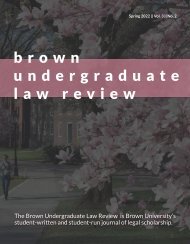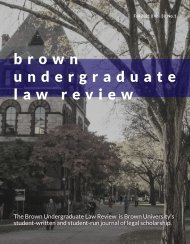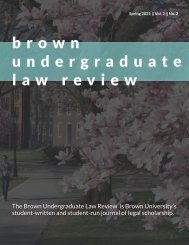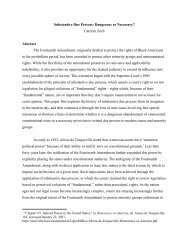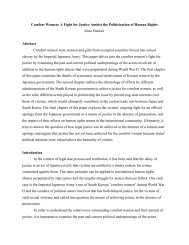Brown Undergraduate Law Review -- Vol. 2, No. 1 (Fall 2020)
We are proud to present the Brown Undergraduate Law Review's Fall 2020 issue. We hope you will all find our authors' works fascinating and thought-provoking.
We are proud to present the Brown Undergraduate Law Review's Fall 2020 issue. We hope you will all find our authors' works fascinating and thought-provoking.
You also want an ePaper? Increase the reach of your titles
YUMPU automatically turns print PDFs into web optimized ePapers that Google loves.
The center-left Concertación coalition, which formed in
opposition to the military dictatorship, took over Chile?s
government with the 1989 election of Patricio Alywin, and
was willing to accept most of Pinochet?s constitution in
exchange for taking power. 7 Written into the constitution
was an electoral system that initially favored the right and
gave the armed forces the authority to intervene in the
political process by appointing senators. 8 With a
right-wing Senate majority barring major changes to the
status quo established under the dictatorship, the
Concertación achieved only minor constitutional reforms
during its first two terms in power. 9
While the congressional balance of power did not change
during the Concertación?s 20-year hold on presidential
power (1990?2010), a 2005 political agreement under
President Ricardo Lagos produced significant reforms to
the constitution. Notably, the Chamber of Deputies?power
to supervise the executive was increased, the presidential
term of office was reduced from six to four years without
consecutive reelection, appointed senatorial seats were
eliminated, and the constitutional states of exception were
reformed to reduce the executive?s authority to transcend
the rule of law. 10 While these reforms eliminated the most
glaringly anti-democratic facets of the constitution, they
did not do away with the supra-majoritarian mechanisms
that essentially give veto power over the entire political
system to the ideological right, nor did they eliminate the
Chile?s Constitutional Renewal: A Lesson to be Learned?
high quorums for constitutional reform. 11
When socialist politician Michelle Bachelet ran for a
second presidential term in 2013, she promised to replace
Pinochet?s constitution with one ?born in democracy.? 12
Opposition politicians expressed concern over the impact
this move might have on foreign investment and the
economy as a whole. 13 In particular, replacing the 1980
constitution would risk the elimination of its economic
core rooted in neoliberal principles, one of the key reforms
sought by many Chileans.
Upon taking office in 2014, Bachelet faced over one
hundred thousand protesters who called for the
constitutional changes they had been promised, and in
October 2015, the President announced the constituent
process that would guide the country to the possibility of a
new constitution. 14 Chileans set out to advance the
emerging constitutional moment, engaging in
self-convened meetings supported by the
government-appointed and politically diverse Citizen?s
Council to generate recommendations for a new
constitution. These were consolidated into a document
titled ?Citizens?Foundations for a New Constitution.? 15
Using this document as a guide, advisors to the Ministry of
the Secretary of the Presidency worked to draft a new
constitution that would be presented to Congress toward
the end of Bachelet?s presidential term. 16 However,
7.Claudio Fuentes, "Shifting the Status Quo: Constitutional Reforms in Chile," Latin American Politics and Society 57, no. 1 (2015): 99.
8. Ibid.
9. Ibid.
10. Ibid., 100.
11. Claudia Heiss, "Legitimacy Crisis and the Constitutional Problem in Chile: A Legacy of Authoritarianism," Constellations: An International
Journal of Critical and Democratic Theory 24, no. 3 (September 2017): 471.
12. "Constitutional History of Chile."
13. Ibid.
14. Cristóbal Bellolio, "Will the People of Chile Succeed in Rewriting Their 'Dictatorship Constitution'?" The Foundation for Law, Justice, and
Society, July 19, 2016, https://www.fljs.org/content/will-people-chile-succeed-rewriting-their-%E2%80%98dictatorship-constitution%E2%80%99.
15. Alberto Coddou McManus, "All Things Must Pass? The State of the Chilean Constitutional Moment," ConstitutionNet, Institute for Democracy
and Electoral Assistance, March 29, 2018.
16. Ibid.
Brown Undergraduate Law Review
30




